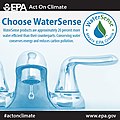Water efficiency
Water efficiency refers to the practice of using water resources in a sustainable and efficient manner, aiming to reduce water waste and ensure that water is used effectively for its intended purposes. This concept is crucial in both domestic and industrial settings, as well as in agriculture, where water is a critical resource for production. Water efficiency encompasses a wide range of practices, technologies, and strategies designed to minimize water use and maximize the utility derived from each unit of water consumed.
Overview
Water efficiency is an essential aspect of sustainable development and environmental management. It involves optimizing water use to reduce unnecessary waste, thereby conserving water for future generations and reducing the environmental impact associated with water extraction, treatment, and disposal. Efficient water use is particularly important in regions facing water scarcity, but it is also relevant in areas with abundant water resources to prevent complacency and ensure sustainability.
Strategies for Improving Water Efficiency
Several strategies can be employed to improve water efficiency, including:
- Water-Saving Technologies: The adoption of water-saving technologies in households, industries, and agriculture can significantly reduce water consumption. Examples include low-flow faucets, efficient irrigation systems, and water-efficient appliances.
- Water Recycling and Reuse: Treating and reusing wastewater for non-potable purposes, such as irrigation and industrial processes, can decrease the demand for fresh water.
- Leak Detection and Repair: Identifying and fixing leaks in water distribution systems can prevent significant water loss.
- Water Conservation Policies: Governments and organizations can implement policies and regulations that encourage or mandate water conservation practices.
- Public Awareness and Education: Educating the public about the importance of water conservation and efficient use can lead to behavioral changes that contribute to water efficiency.
Benefits of Water Efficiency
Improving water efficiency has numerous benefits, including:
- Reducing Water Scarcity: Efficient water use can alleviate water scarcity by stretching existing water supplies further.
- Environmental Protection: By reducing the need for water extraction and treatment, water efficiency can lessen the impact on natural ecosystems and decrease energy consumption associated with water services.
- Economic Savings: Both consumers and utilities can save money through reduced water consumption and lower energy bills due to decreased demand for water heating and treatment.
- Enhanced Water Security: Efficient water use contributes to water security by ensuring that sufficient water is available to meet the needs of people, agriculture, and industry.
Challenges to Water Efficiency
Despite its benefits, there are challenges to achieving water efficiency, including:
- Economic and Financial Barriers: The initial cost of implementing water-efficient technologies and infrastructure can be high.
- Lack of Awareness: There may be a lack of awareness or understanding of water efficiency benefits and practices among the public and policymakers.
- Policy and Regulatory Hurdles: Inadequate policies or regulations can impede the adoption of water-efficient practices and technologies.
- Cultural and Behavioral Factors: Changing established water use habits and cultural norms can be difficult.
Conclusion
Water efficiency is a critical component of sustainable water management and environmental stewardship. By adopting efficient water use practices and technologies, societies can ensure the availability of water resources for future generations, protect the environment, and realize economic benefits. Achieving water efficiency requires concerted efforts from individuals, businesses, and governments, as well as a commitment to overcoming the challenges associated with changing water use behaviors and investing in efficient technologies.
This article is a environment-related stub. You can help WikiMD by expanding it!
Transform your life with W8MD's budget GLP-1 injections from $125.
W8MD offers a medical weight loss program to lose weight in Philadelphia. Our physician-supervised medical weight loss provides:
- Most insurances accepted or discounted self-pay rates. We will obtain insurance prior authorizations if needed.
- Generic GLP1 weight loss injections from $125 for the starting dose.
- Also offer prescription weight loss medications including Phentermine, Qsymia, Diethylpropion, Contrave etc.
NYC weight loss doctor appointments
Start your NYC weight loss journey today at our NYC medical weight loss and Philadelphia medical weight loss clinics.
- Call 718-946-5500 to lose weight in NYC or for medical weight loss in Philadelphia 215-676-2334.
- Tags:NYC medical weight loss, Philadelphia lose weight Zepbound NYC, Budget GLP1 weight loss injections, Wegovy Philadelphia, Wegovy NYC, Philadelphia medical weight loss, Brookly weight loss and Wegovy NYC
|
WikiMD's Wellness Encyclopedia |
| Let Food Be Thy Medicine Medicine Thy Food - Hippocrates |
Medical Disclaimer: WikiMD is not a substitute for professional medical advice. The information on WikiMD is provided as an information resource only, may be incorrect, outdated or misleading, and is not to be used or relied on for any diagnostic or treatment purposes. Please consult your health care provider before making any healthcare decisions or for guidance about a specific medical condition. WikiMD expressly disclaims responsibility, and shall have no liability, for any damages, loss, injury, or liability whatsoever suffered as a result of your reliance on the information contained in this site. By visiting this site you agree to the foregoing terms and conditions, which may from time to time be changed or supplemented by WikiMD. If you do not agree to the foregoing terms and conditions, you should not enter or use this site. See full disclaimer.
Credits:Most images are courtesy of Wikimedia commons, and templates, categories Wikipedia, licensed under CC BY SA or similar.
Contributors: Prab R. Tumpati, MD







